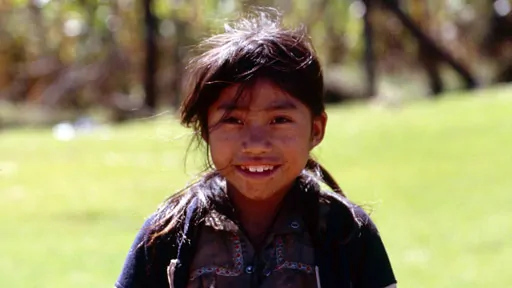Indigenous Calendar August, 2010: Tzeltal Maya Poster Child for Education

Many history text books use terms like "the lost Maya civilization" to refer to the many indigenous peoples of Mesoamerica who, collectively, are known as the Maya. The implication behind such terms is that these peoples simply disappeared inexplicably and without any living trace — much like it was once thought that the dinosaurs did.
The reality is that while Maya peoples did experience a drastic decline in both their population and their political power in Mesoamerica, they did not disappear. Visitors to Mexico, Guatemala, Belize, El Salvador and Honduras can find living members of dozens of ethnolinguistically Maya peoples today.
Among these surviving peoples are the Tzeltal. Around three hundred thousand Tzeltal people live, mainly, in the Central Highlands of the Mexican state of Chiapas. It was here that I visited many Tzeltal communities. I was surprised to see how similar their modern world is to how we can only imagine their pre-historical world must have been. Of course there have been significant changes but even today many Tzeltal people still speak their indigenous language as their first language; many still observe and practice their religious heritage; many still produce pottery using pre-Columbian techniques and subsistence agriculture is still the driving economy-of-survival for most Tzeltal people.
My guide was driving me between two Tzeltal villages when I noticed this young girl standing behind a vegetable stall at the side of the road. She was selling the vegetables. I asked my guide to stop and back-up so I could talk to her. She speaks Spanish so I learned that she was nine years old and had never attended school. Instead, she, like her ancestors, had grown up with the expectation that her late childhood would be spent contributing her labor capacity to her family's economic needs. As I spoke to her I remembered thinking that the literal sacrifice of children's lives is no longer practiced by the Maya, but the sacrifice of their children's education is!
She allowed me to take this photo. Neither she nor I understood at that time that if there can be a "poster child" for supporting indigenous education there surely cannot be many better examples of it. Please help us to provide education to deserving children like her.
The Tzeltal Maya are featured in our documentary, Ancient and Modern Mayan Peoples.
If you enjoyed reading this article, please consider supporting independent, advertising-free journalism by buying us a coffee to help us cover the cost of hosting our web site. Please click on the link or scan the QR code. Thanks!


